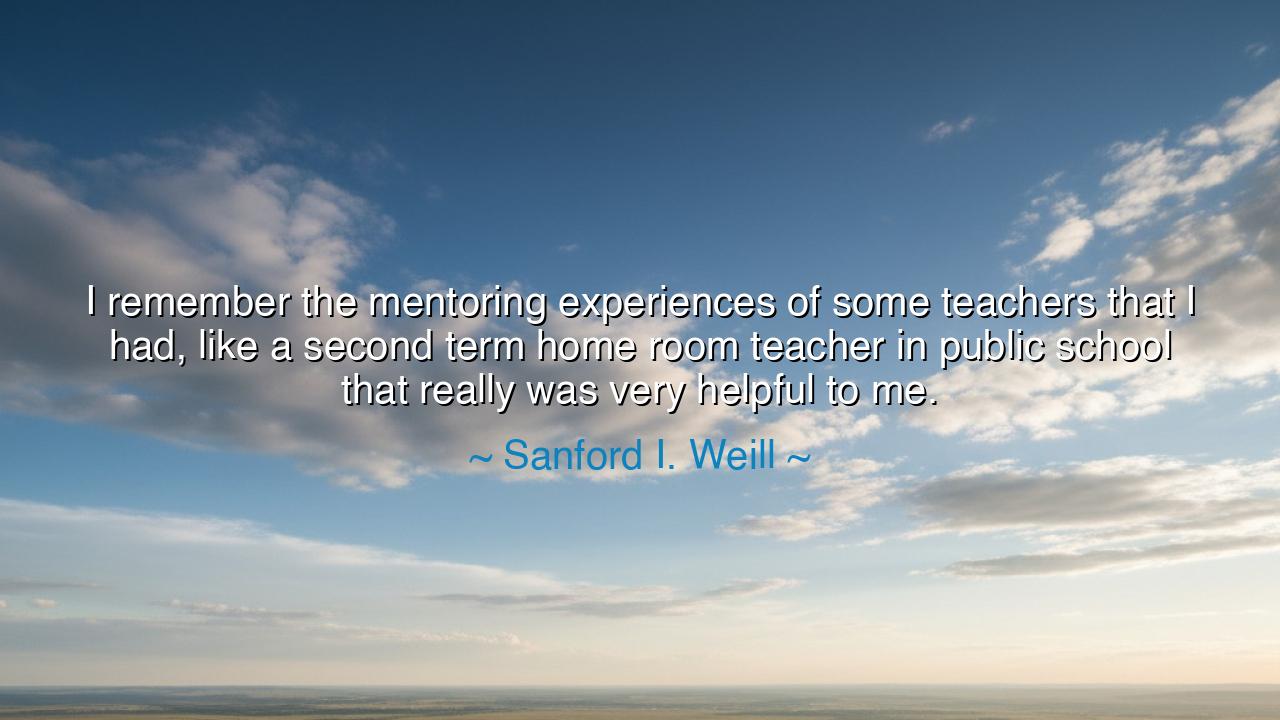
I remember the mentoring experiences of some teachers that I
I remember the mentoring experiences of some teachers that I had, like a second term home room teacher in public school that really was very helpful to me.






Sanford I. Weill, the financier who rose from modest beginnings to great prominence, once recalled: “I remember the mentoring experiences of some teachers that I had, like a second term home room teacher in public school that really was very helpful to me.” These words, spoken with humility, remind us that even the mightiest pillars of society were once young and uncertain, shaped not only by ambition, but by the steady hands of those who guided them in their earliest years. Behind every man or woman of renown, there is often a quiet teacher whose influence remains carved upon the heart.
The meaning of this quote lies in the power of mentorship, especially in the formative years of youth. Weill does not remember merely lessons in arithmetic or grammar; he remembers the guidance of a teacher who saw him not only as a student, but as a person in need of encouragement. This guidance was not grand, nor gilded with fame, but it was deeply helpful—the kind of help that strengthens confidence, stirs aspiration, and gives a young soul courage to believe in their own potential. In such small acts lies the foundation of greatness.
The origin of this reflection is simple yet profound: it springs from the humble setting of a public school, not from elite halls or privileged academies. It is there, in the ordinary classroom, where the extraordinary seeds of character are often sown. A “second term home room teacher” may seem insignificant in the annals of history, but to a boy named Sanford, that presence was a turning point. This reveals to us a truth: greatness is not born only of genius or wealth, but of timely guidance offered in moments of need.
History is full of stories that mirror this truth. Consider Alexander the Great, who conquered empires but never ceased to honor his mentor Aristotle, saying that though he owed his life to his father, he owed the quality of that life to his teacher. Or think of Helen Keller, who might have remained lost in silence had it not been for the unyielding patience of Anne Sullivan, who opened her world with language and love. These stories, like Weill’s remembrance, show that mentorship is often the hidden key that unlocks human destiny.
The quote also reveals the sacred role of teachers as more than conveyors of information. A true teacher is a mentor, a guide, sometimes even a lifeline. They help shape not only intellect but also character, planting seeds of perseverance, discipline, and hope. The “help” they offer often transcends textbooks—it may be a word of encouragement, a recognition of hidden talent, or the patient presence of someone who believes in a child before the child believes in themselves.
The lesson for us is clear: never underestimate the power of a guiding word, a patient ear, or a moment of mentorship. If you are a teacher, know that your influence may shape destinies beyond what you can see. If you are a student, remember with gratitude those who have guided you, for their counsel has been part of your journey. And if you are neither, yet have the chance to guide another, embrace it—for to mentor is to invest in the future of the world.
Practically, this means living attentively to those around us. Look for those who struggle silently, and offer encouragement. Share knowledge, but also share faith in another’s potential. Support teachers, honor their work, and when possible, take up the mantle of mentor yourself. For what may seem a small gesture—a word of belief, a hand extended—may one day be remembered as the turning point in another’s life.
So let Sanford I. Weill’s memory echo across generations: a teacher, unnamed by history, yet remembered by a student, gave the gift of guidance that helped a young man rise. In this we see the eternal truth: though crowns and riches fade, the influence of a teacher endures, flowing silently into the achievements of those they once guided. And thus, to mentor is to shape not only one life, but the destiny of all who will be touched by that life in turn.






AAdministratorAdministrator
Welcome, honored guests. Please leave a comment, we will respond soon